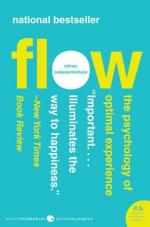
|
| Name: _________________________ | Period: ___________________ |
This test consists of 5 multiple choice questions, 5 short answer questions, and 10 short essay questions.
Multiple Choice Questions
1. In the author's research, ___________ was perceived the same way by all involved, regardless of age, ethnicity or social/economic rank.
(a) Disease.
(b) Energy.
(c) Hunger.
(d) Flow.
2. When there is no real sense of self within a person because of the outside distractions, that person is said to be ______________.
(a) A zombie.
(b) Programmed.
(c) Dead.
(d) A sheep.
3. _______ is another physical activity which relies on the rhythmic movement to produce flow.
(a) Sex.
(b) Walking.
(c) Running.
(d) Childbirth.
4. The __________ system does not allow the ability to expand the consciousness to such a high degree.
(a) School.
(b) Goverment.
(c) Therapy.
(d) Nervous.
5. What would be the result if the mind did not attempt to put the experiences it has in some sort of order?
(a) Nothing.
(b) Depression.
(c) Psychotic break.
(d) Confusion.
Short Answer Questions
1. One can almost experience flow before a ____________ event because of the love of the art.
2. One large obstacle to joy and the feeling of fulfillment is the act of feeling ______________ during one's life.
3. Many people believe they are meant to be _____________ or they are not - no wiggle room between sides.
4. Flow can actually occur in a variety of ways. Flow can be completely _______________ or it can be structured.
5. What is the name that the author has coined for people who are internally driven to find flow in their lives?
Short Essay Questions
1. What does the author think would happen if a person did not have a consciousness?
2. Since it is not necessarily the events in one's life that cause happiness, what does the author propose causes the happiness around events?
3. What are some of the problems an autoletic person can encounter in trying to achieve flow?
4. What is the relationship between culture and the way a person can experience flow in his life?
5. What is the question that the book says psychologists and philosophers are no closer to finding the answer to?
6. What is consciousness, according to the author, causing it to seem less like a mystical thing?
7. What does the author say goes hand in hand with many things that are enjoyable?
8. What might happen if a person were to burst into an office demanding answers as to why they got passed over for a promotion?
9. Where does flow tend to occur most often in life, according to the author?
10. How does the author say that happiness can be achieved, as he does not believe it is an unattainable goal?
|
This section contains 624 words (approx. 3 pages at 300 words per page) |

|




